| BrianRxm | Coins in Movies | 274/418 |
| Passage to Marseille (1944) |
A chest of Mexican coins helps French prison escapees join the Free French
| Prev | Back | Next |
The 1944 film "Passage to Marseille" is set before and during World War II.
The film is about a group of Frenchmen who escape from the Devil's Island prison in a boat in order to
return to France to fight the invading German Nazis.
They are rescued from the sea by a French cargo ship, and, when France surrenders to Germany,
join the ship's crew in taking the ship's valuable cargo to England.
The story was based on the 1942 novel Sans Patrie (Men Without Country) by
Charles Nordhoff and James Norman Hall.
At one point, an elderly French prisoner who has been catching and selling butterflies to tourists,
deposits the proceeds of his latest sale into a chest of coins, which appear to be real Mexican coins,
not film prop coins.
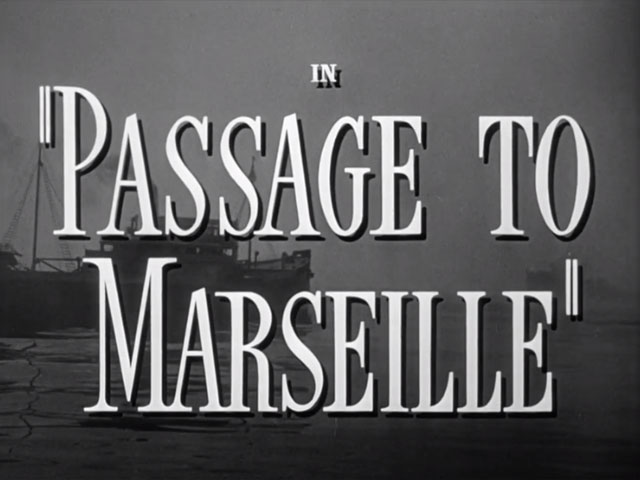
1. Title
The film begins with a dedication to the Free French:
This is the story of a Free French Air Squadron.
It is also the story of France.
For a nation exists, not alone in terms of maps and boundaries, but in the hearts of men.
To millions of Frenchmen, France has never surrendered.
And today, she lives, immortal and defiant, in the spirit of the Free French Air Force,
as it carries her war to the skies over the Rhineland.
A newspaper reporter arrives at a Free French air base located in England.
The reporter meets Captain Freycinet of the air force who is a ground (non-flying) officer.
As the bombers take off to attack Germany, he tells the reporter the story of a group of
Frenchmen who are members of the air squadron.
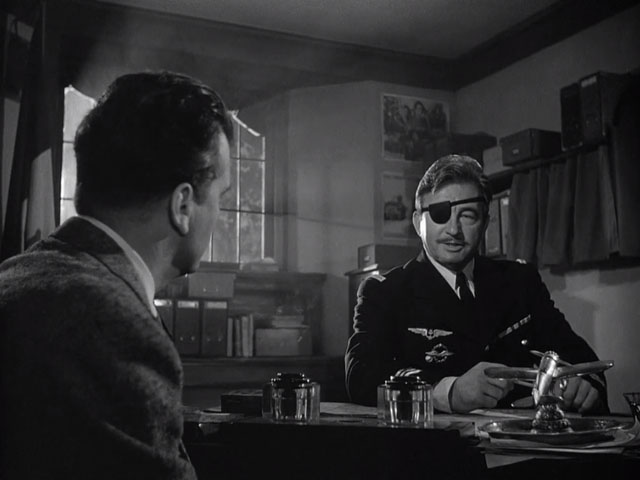
2. Captain Freycinet tells reporter the story
It is 1940 and a French cargo ship, the Ville de Nancy, is carrying a cargo of several tons of nickel.
Nickel was a scarce commodity during World War II, as American audiences in 1944 would know
just by examining their coins and finding that recent five cent coins looked "different."
From 1942 to 1945 American five cent coins ("nickels"), previously made from copper and nickel,
were made from copper, silver, and magnesium.
The ship is sailing north of Venezuela headed to France.
The crew of the ship spots a boat with men on it and rescues the men.
The ship's captain, Captain Freycinet, questions the men, who tell him that they were gold miners
sailing out of Venezuela whose boat capsized causing the men to lose their gold and their
identification papers.
Captain Freycinet and some of the crew are French patriots, and a Major Duval and some others
are pro-German fascists.
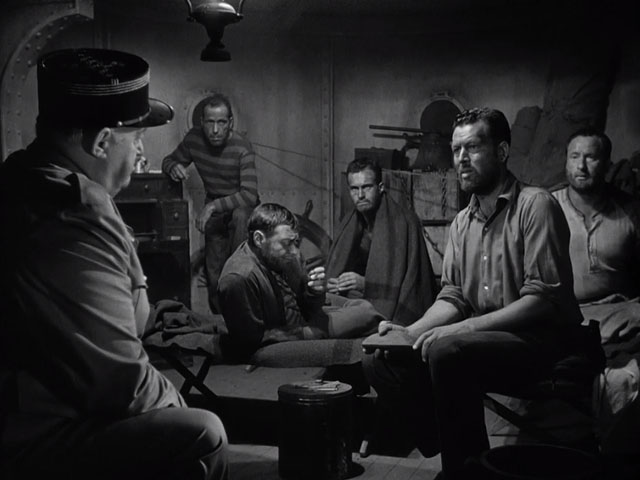
3. Major Duval questions the men
Major Duval questions the men and expresses the belief that the men are actually escapees from the
French Guiana prison of Devils' Island.
The men admit that they are escapees and tell their story to Captain Freycinet.
The men were sent to Devil's Island for various crimes, except for Jean Matrac, the publisher of a
French anti-fascist newspaper. Matrac was falsely convicted of murder and sent to prison.
The men met an elderly freed prisoner named Grandpère (grandfather) who is a French patriot.
He has a business of collecting butterflies and selling them to tourists.
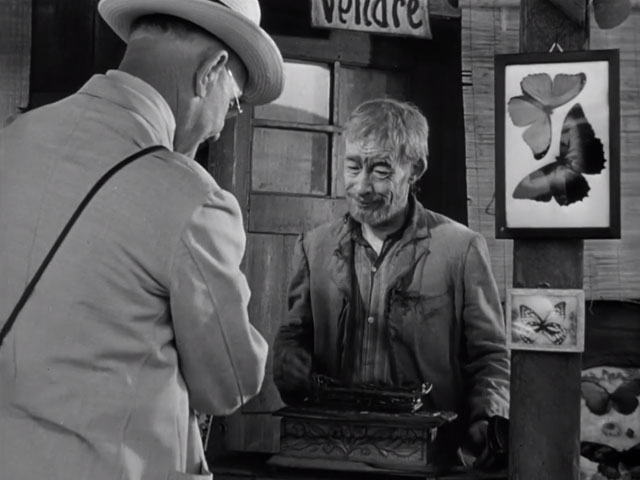
4. Grandpère sells his butterflies
Grandpère has a chest which he keeps his money in.
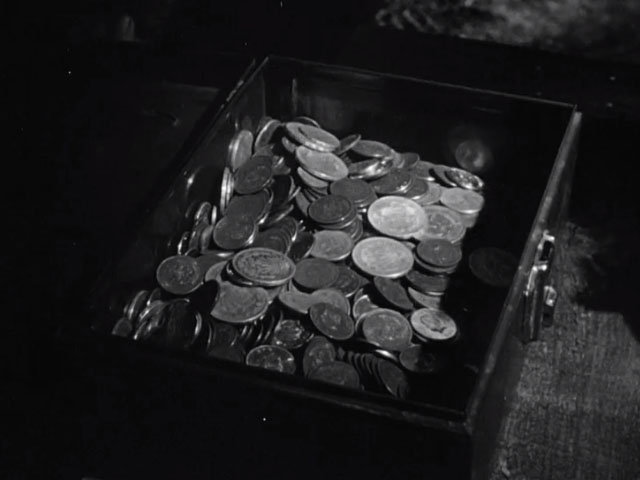
5. Grandpère's money chest with coins
The following pictures are of the chest before and after Grandpère puts some money into it.
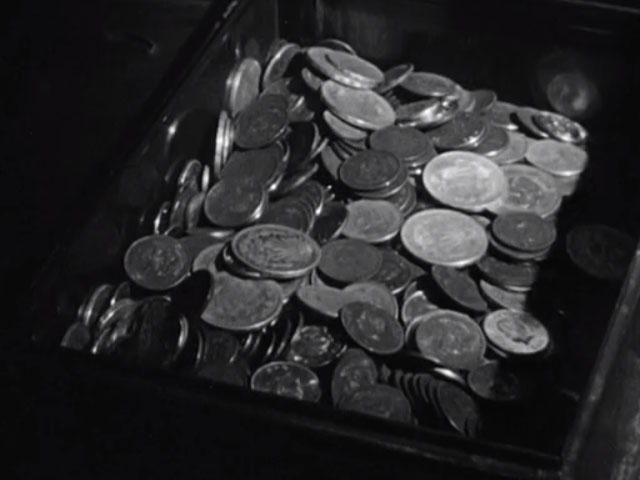
6. Grandpère's money chest before adding coins
The coins are real Mexican coins.
Several silver one peso coins of the period 1920 to 1945 appear, along with five centavo coins
of the 1942 to 1955 "Josefa" design, and smaller silver coins of 50 centavos.
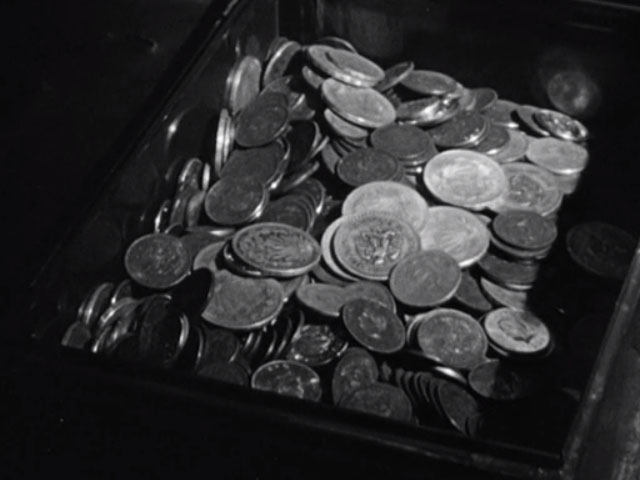
7. Grandpère's money chest after adding coins
The chest is joined by a newly arrived Mexico peso.
A similar Mexico peso dated 1924:
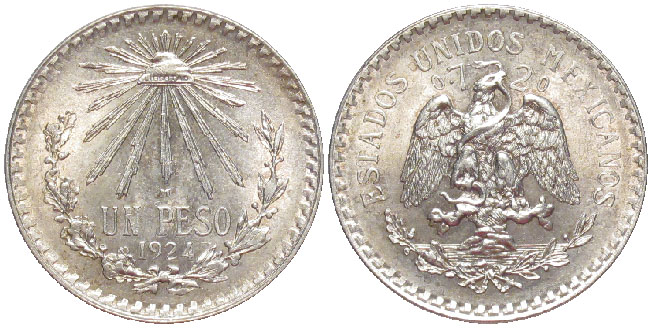
8. Mexico peso 1924
Silver, 34 mm, 16.68 gm
Back to the film:
One of the men tells Jean Matrac's story:
Jean Matrac was the publisher of a French anti-fascist newspaper.
A woman named Paula worked for the newspaper and later became his wife.
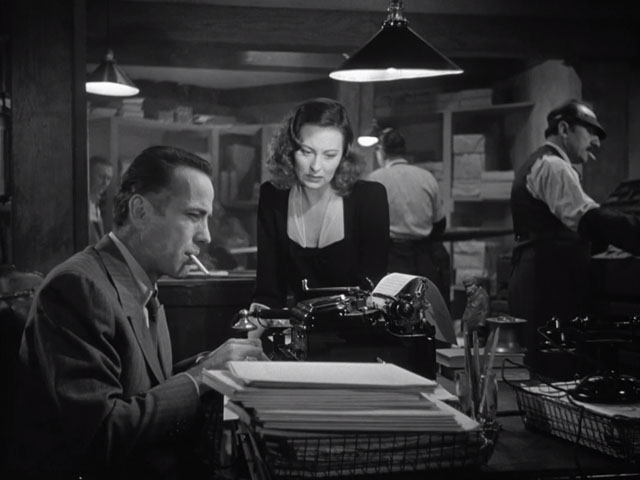
9. Jean Matrac and Paula in newspaper office
Jean's paper published an anti-German editorial followed by a riot where a mob broke into the office
and destroyed the presses and killed some of the staff. French fascists arranged the arrest and
conviction of Jean for murder and had him sent to the prison.
Back on the ship, they hear by radio of the surrender of France to Germany and the occupation of
their country by Nazis.
Major Duval appears and announces that the crew should "accept reality" and join the
"Vichy" or pro-Nazi French government.
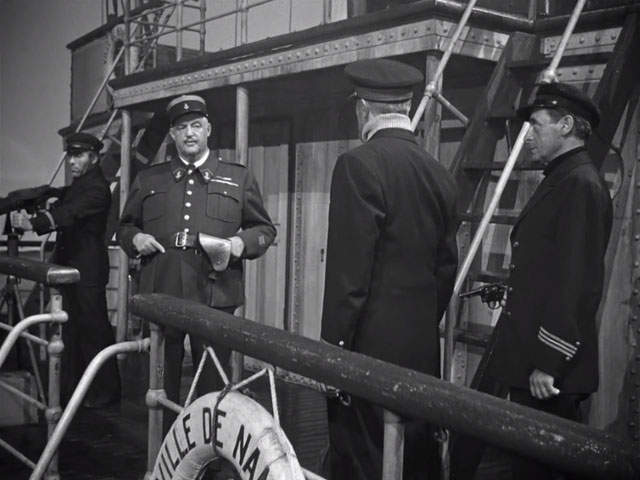
10. Major Duval confronts the ship's officers
Major Duval wants the ship to sail with it's valuable cargo of nickel to its original (occupied)
French port but the patriot captain wants to change the destination to England.
Major Duval leads a short mutiny attempt.
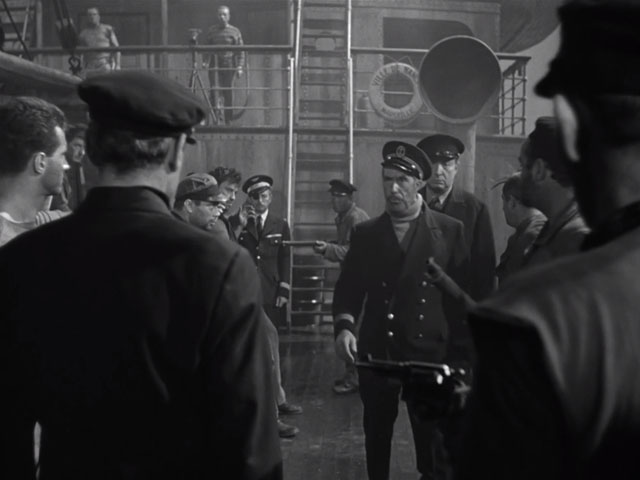
11. The mutiny
Major Duval's mutineers are overpowered by loyal French crewman, but the pro-Vichy radio operator
sends out a message giving the ship's position. The message is received by a German bomber.
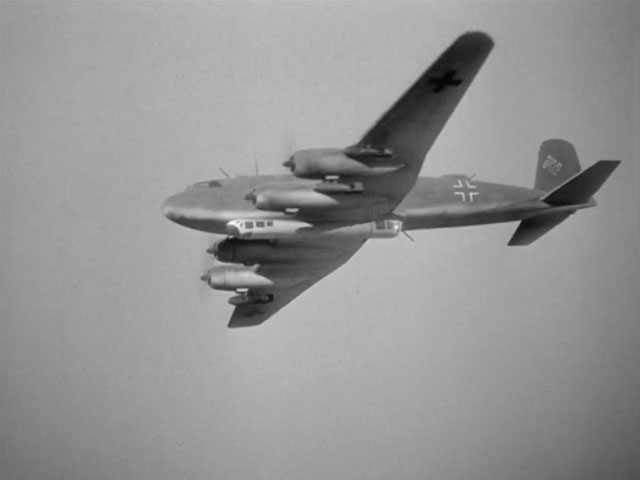
12. German bomber
The bomber attacks the ship with bombs and machine gun fire and the crew fire it's guns at the plane.
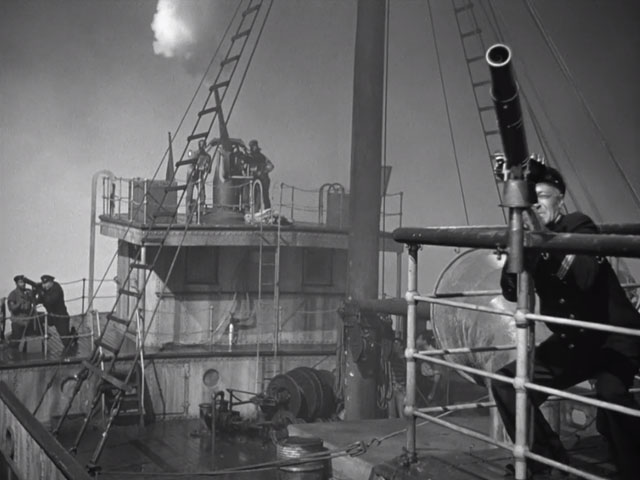
13. Ship's crew firing on bomber
Jean is one of the anti-aircraft men.
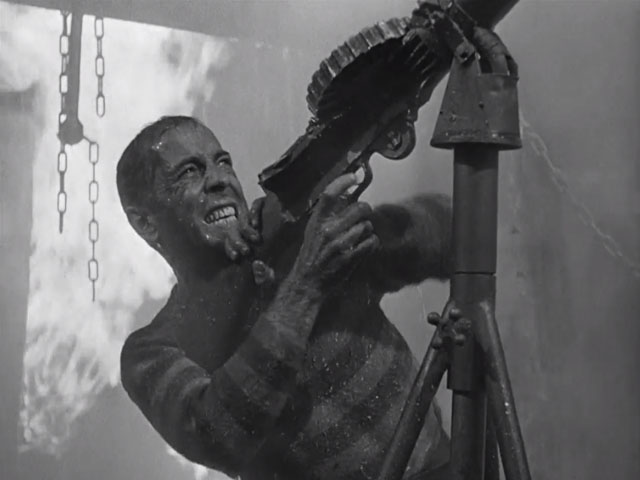
14. Jean fires on the airplane
The bomber catches fire and crashes into the sea and the ship sails on to England.
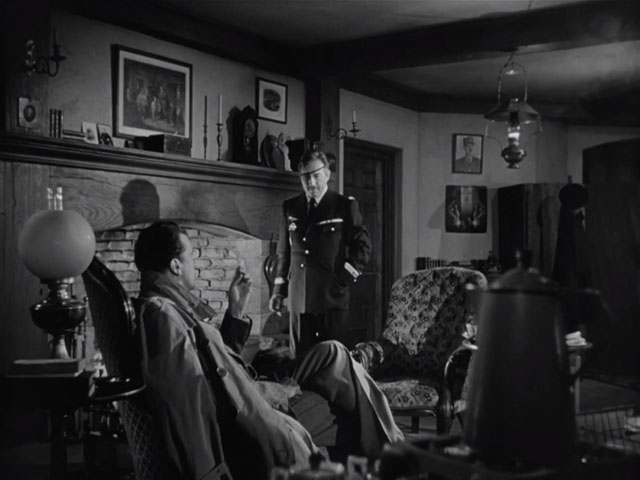
15. Captain Freycinet finishes his story
The planes are returning to their English base but the airplane "V for Victor", carrying
Jean Matrac as a gunner, has not arrived.
The return route takes the plane near the French house of Jean's wife Paula and their son.
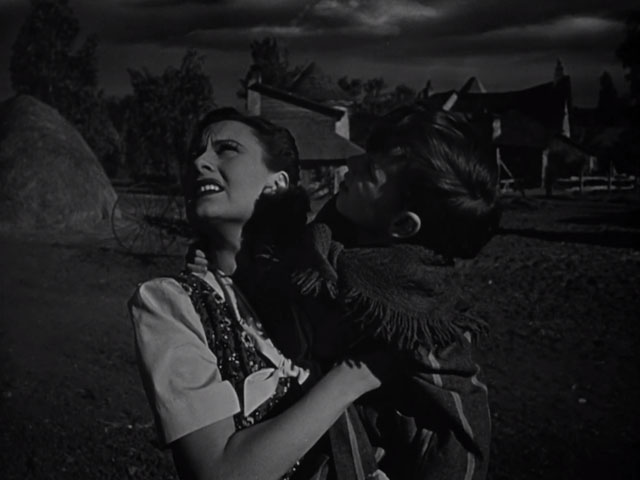
16. Paula and her son watching the skies
Jean has previously dropped letters to his wife but not this time.
The airplane, severly damaged, arrives at the English base.
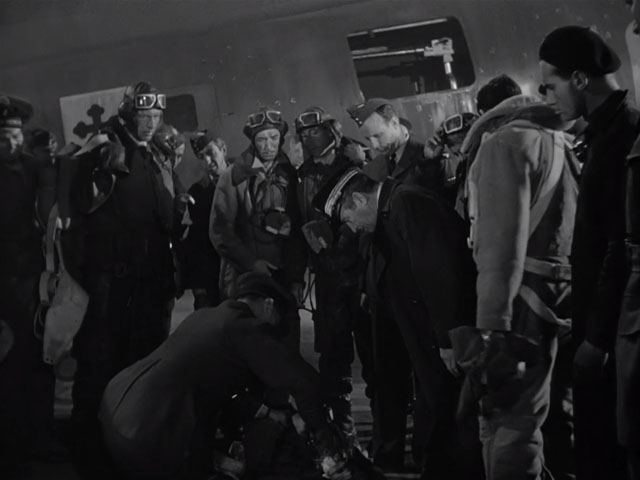
17. "V for Victor" arrives with Jean
Jean is taken off the airplane and it is discovered that he is dead.
A letter from Jean to his son is found and later read at Jean's memorial service.
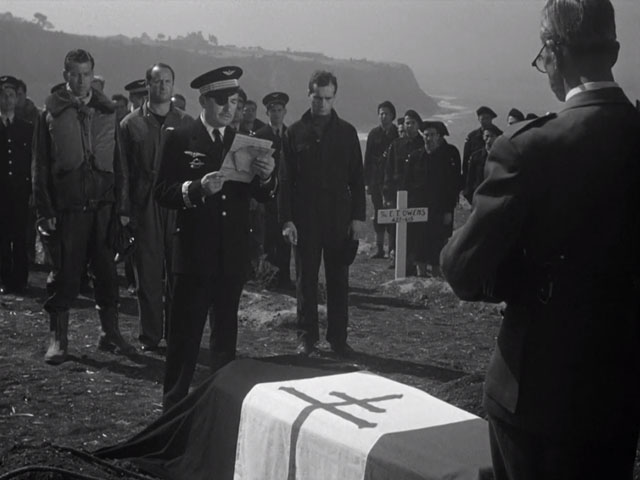
18. Captain Freycinet reads Jean Matrac's last letter
My dear son, today you are 5 years old and your father has never seen you.
But someday, in a better world, he will.
Take care of your mother, Jean.
I hold you in my arms.
I kiss you both.
May God keep you and love you as I do.
Good night and au revoir till our work is finished.
And until I see you, remember this. France lives. Vive la France.
Cast, Directors, Writers:
Humphrey Bogart as Jean Matrac
Claude Rains as Captain Freycinet
Peter Lorre as Marius
Sydney Greenstreet as Major Duval
Michele Morgan as Paula
Director: Michael Curtiz
Writers: Casey Robinson, Jack Moffitt
Based on the 1942 novel Sans Patrie by Charles Nordhoff and James Norman Hall
Claude Rains as Captain Freycinet
Peter Lorre as Marius
Sydney Greenstreet as Major Duval
Michele Morgan as Paula
Writers: Casey Robinson, Jack Moffitt
Based on the 1942 novel Sans Patrie by Charles Nordhoff and James Norman Hall
| Prev | Back | Next |